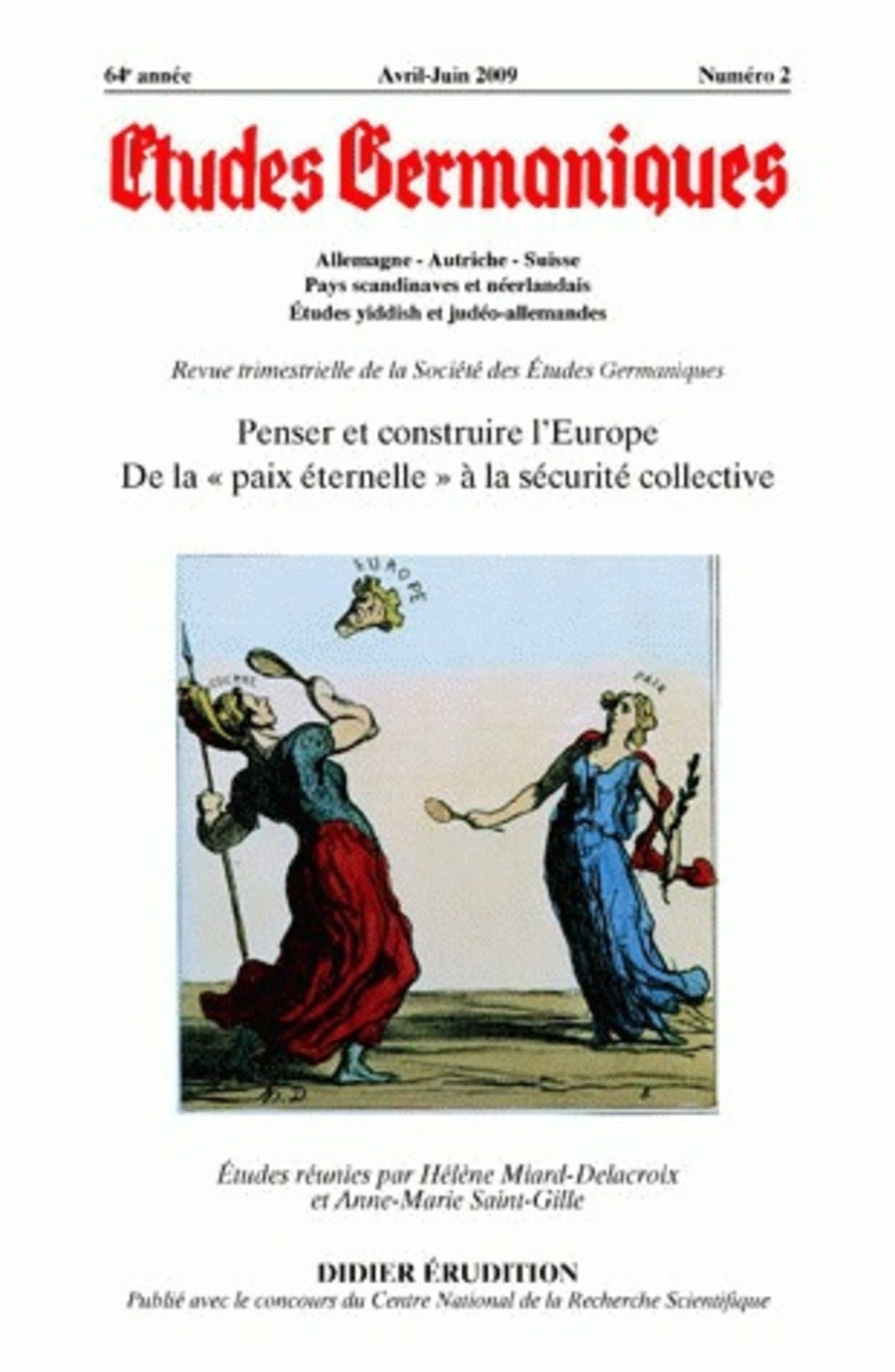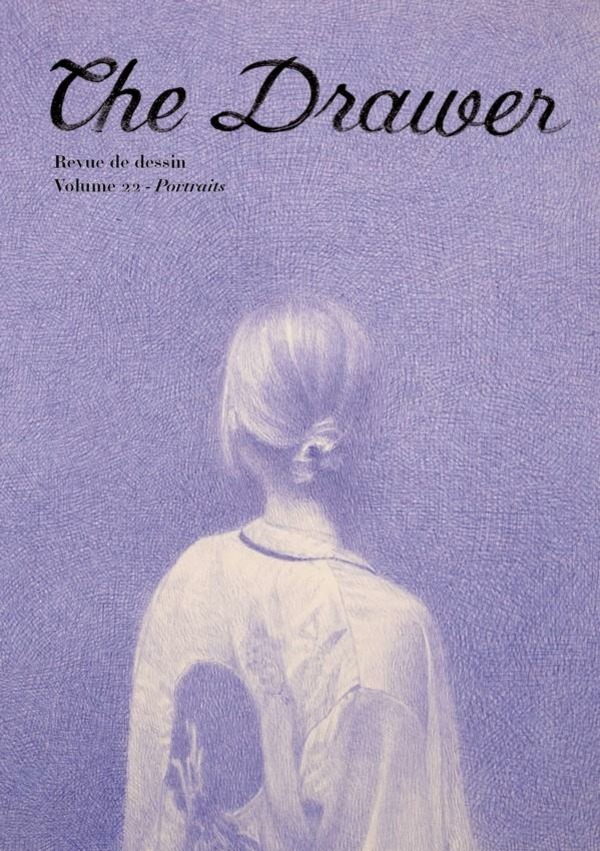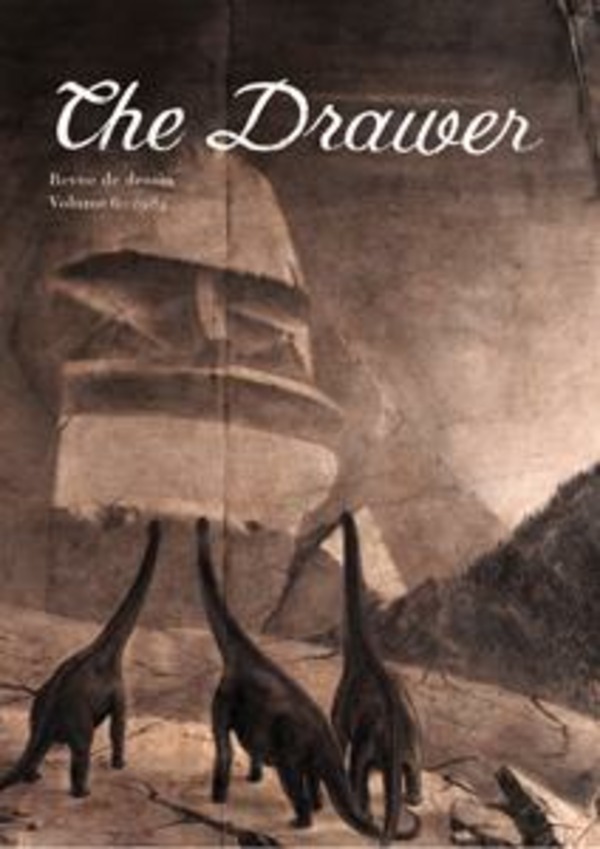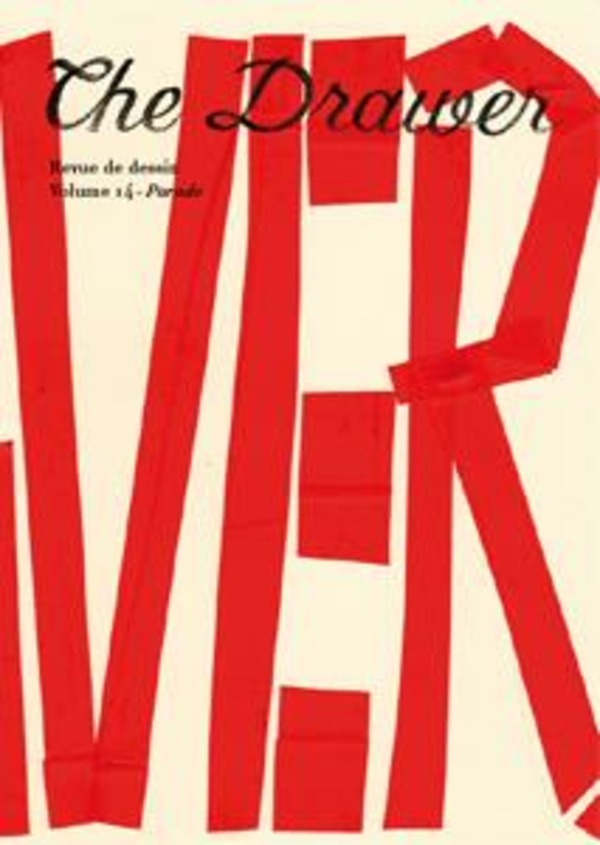Études germaniques - N°2/2009
Penser et construire l'Europe. De la "paix éternelle" à la sécurité collective

- 176 pages
- Livre broché
- 15 x 23 cm
- Études germaniques
- Parution : 08/07/2009
- CLIL : 3146
- EAN13 : 9782252037027
- Code distributeur : 34402
Présentation
Paul Michael LÜTZELER, Der Europadiskurs der Schriftsteller als Plädoyer für den Frieden
The discourse on Europe developed as a discourse on peace during and after the great wars between the 17th and the 20th century. It was a discourse in which primarily writers were engaged in, authors who contributed to it by means of essays, pamphlets and visionary plans. The dialogic interplay between identity, the imaginary and ideology were of special importance in the development of this discourse. The leading representative of the discourse on Europe as a discourse on peace came from France and Austria (Sully, Abbé Saint-Pierre, Rousseau, Saint-Simon, Hugo, Bertha von Suttner, Coudenhove-Kalergi).
Du XVIIe au XXe siècle, le discours sur l'Europe a pris la forme d'un discours de paix pendant et après les grandes guerres européennes. La contribution des écrivains à l'élaboration d'un discours européen, sous la forme d'essais, de prises de position et de projets d'avenir, est particulièrement notable. Dans ce cadre, le rapport dialogique entre identité, imaginaire et idéologie a joué un rôle central dans le développement d'une identité européenne. Les voix les plus représentatives de ce discours européen conçu comme un discours de paix sont originaires de France ou d'Autriche. (Sully, Abbé de Saint-Pierre, Rousseau, Saint-Simon, Hugo, Bertha von Suttner, Coudenhove-Kalergi).
Françoise KNOPPER, Théorie et pratique de l'équilibre politique européen dans la presse allemande de la fin du XVIIIe siècle (1788-1813)
The theory of « balance of power » allowed it in the late 18th century to get away from a religious definition of peace without denying the model of the Westphalia peace. As a law instrument applying to the states and based on reason and sociability, this theory constituted the pragmatic alternative to « eternal » peace. But in the eyes of those who criticized it, it was a mere dream, a « chimera ».
In the German press this debate was increased in 1795 through the Treaty of Basel. Then, between 1797 and 1803, those who were afraid of the dismembering of the Holy Empire tried to make its inner tensions harmless by considering them as an illustration for the good working of any balance that warranted the coexistence of States, since it was always necessary to adjust it.
As it became an argument against the Napoleonian propaganda which tried from 1805 on to impose a reorganisation of Europe, the balance theory was mentioned again in the years 1808-1812 but connected with a spiritual revival.
Durch die Theorie des « Gleichgewichts der Mächte » gelang es am Ende des 18. Jahrhunderts von der religiösen Definition des Friedens Abstand zu nehmen, ohne dabei das Modell des Westfälischen Friedens aufzugeben. Da sich diese Theorie als juristisches Instrument auf die Staaten bezog und auf Vernunft und Soziabilität gründete, stellte sie die pragmatische Variante des ewigen Friedens dar. Aber für die Kritiker war sie nur eine « Chimäre ».
In der deutschen Presse bekam diese Debatte 1795 durch den Separatfrieden von Basel neue Nahrung. Zwischen 1797 und 1803 versuchten diejenigen, welche die Auflösung des Heiligen Römischen Reiches befürchteten, die ehemaligen Spannungen innerhalb des Reiches herunterzuspielen, und zwar durch die Behauptung, gerade die Spannungen seien das Zeichen eines gut funktionierenden Gleichgewichts, das durch unaufhörliches Ausgleichen die Koexistenz der Staaten garantiere. Diese Theorie wurde ein Argument gegen die napoleonische Propaganda – die ab 1805 bestrebt war, die Widerstände gegen eine Reorganisation Europas auszuräumen –, wobei die religiöse Komponente allerdings wieder zum Vorschein kam.
Ingrid RADEMACHER, Johann Caspar Bluntschli – conception du droit international et projet de Confédération européenne (1878)
The controversy between Bluntschli and Lorimer makes up one of the theoretic high points of the debate on the creation of a United States of Europe. Lorimer considered that the interests of European unity and peace would be best served by the creation of a European federal state along with the establishment of a European Army and the reduction of national forces ; whilst on the other hand, Swiss lawyer and politician Bluntschli considered that a unified Europe should take the form of a Confederation of European states, with each state retaining sovereignty. The positions of each are presented, although an emphasis is placed on Bluntschli's proposal which, he considered responded best to his notion of international law ; although the ethical and universal roots of the latter do allow for the restriction of state sovereignty in certain specific cases. The article demonstrates that the project of confederation and notions of international law are nonetheless complementary and that the European community will in the long term become a part of the Universal State.
In der Debatte um die Vereinigten Staaten von Europa stellt die Kontroverse zwischen Lorimer und Bluntschli einen theoretischen Höhepunkt dar. Verteidigt James Lorimer das bundesstaatliche Modell und die Bildung einer internationalen Armee nach Reduzierung der nationalen Streitkräfte, so sieht der Schweizer -Jurist und Politiker Bluntschli in einer europäischen Konföderation, die die staatliche Souveränität wahrt, den geeigneteren Weg der Friedenssicherung. Die konträren Positionen werden vorgestellt, wobei der Akzent auf dem Konföderationsprojekt liegt. Bluntschlis Entwurf ist darüber hinaus im Kontext seiner Völkerrechtslehre zu sehen. Seine Auffassung der internationalen Rechtsgemeinschaft geht von einer über allen Staaten stehenden Menschenrechtsordnung aus, die die Einschränkung staatlicher Souveränität durch das Völkerrecht in bestimmten Fällen legitimiert. Es wird gezeigt, inwiefern die Europa- und Völkerrechtskonzeption dennoch komplementär sind und die europäische Gemeinschaft dazu bestimmt ist, langfristig Teil eines Weltsta[a]ts zu werden.
Wolfgang FINK, (Klassen)Kampf der Nationen Der Streit um Otto Bauer und die Nationalitätenfrage
The study analyses The question of nationalities and the social democracy published by Otto Bauer in 1907 and assumed to correct the deficit of Marxist theory concerning the political and historical definition of nation. The Darwinist matrix, also apparent in Bauer's political articles, prevents a uniterm statement and aligns Bauer with German nationalist propaganda.
L'étude porte sur l'ouvrage La question des nationalités et la social-démocratie publié par Otto Bauer en 1907 et censé combler les lacunes de la pensée marxiste en ce qui concerne la définition de la nation en tant que catégorie historique et politique. La matrice darwiniste, manifeste également dans de nombreux articles politiques de l'auteur, empêche cependant une prise de position univoque et rapproche Otto Bauer des courants nationalistes allemands.
Jean-Michel GUIEU, Le discours européen des militants pour la Société des Nations dans l'entre-deux-guerres
The international movement for the League of Nations was increasingly conscious of the difficulty of maintaining peace on the continent through only universal solutions. Some activists, particularly in France, came round to the idea of strengthening the Geneva institution on a regional basis, notably through a European federation.
Die internationale Bewegung für den Völkerbund wurde sich allmählich der Schwierigkeit bewusst, den Frieden in Europa nur durch universelle Lösungen wahren zu können. Einige – besonders französische – Aktivisten schlossen sich deshalb mehr und mehr der Vorstellung an, die Genfer Organisation durch regionale Verankerungen, insbesondere einer europäischen Föderation, zu stärken.
Landry CHARRIER, La Revue de Genève Hantise de la décadence et avenir de l'Europe (1920-1925)
This article sets out to assess the way in which La Revue de Genève contributed to the development of the idea of a united Europe in the period between the two world wars. Robert de Traz's periodical, which was based on a tragic perception of the situation in Europe, was a panegyric of a Europeist ideal, that drew its inspiration from the Genevan genius and the Helvetic political system. It was also a unique meeting point for those whose ideas were close to the spirit of the League of Nations.
Ziel dieses Artikels ist es, den Beitrag der Revue de Genève (1920-1930) zur Entwicklung der Europaidee während der Zwischenkriegszeit zu beurteilen. Die von Robert de Traz gegründete Zeitschrift trat für ein europäisches Ideal ein, das sich auf die Genfer Tradition und auf das politische System der Schweiz stützte. Die Revue de Genève war aber auch ein einzigartiger Begegnungsort verschiedenster indivi-dueller Gedankenströmungen im Sinne der Völkerbundsidee.
Marie-Odile THIROUIN, Que faire des nations en Europe ? Réflexions sur la question des nationalismes à partir de l'œuvre européenne de Rudolf Pannwitz (1881-1969)
The present paper deals with the European works of Rudolf Pannwitz (1881-1969), a German poet and thinker, who suggested to build Europa neither against the nations nor without them, but cooperating with them. The first part of the paper presents Pannwitz's commitment to Europe in the context of similar contemporary European conceptions. Afterwards the second part shows how Pannwitz tries to win some energy from the different nationalisms competing in Europe on behalf of a common European construction ; he relies on the experience of Central Europe in order to demonstrate the possibility of this project.
Der vorliegende Beitrag beschäftigt sich mit dem europäischen Werk des deutschen Dichters und Denkers Rudolf Pannwitz (1881-1969), der zum Ziel hatte, Europa nicht gegen die Nationen noch ohne die Nationen aufzubauen, sondern mit den Nationen. In einem ersten Teil werden Spezifika von Pannwitz' europäischem Engagement vor dem Hintergrund der zeitgenössischen Europakonzeptionen herausgearbeitet. Der zweite Teil legt dar, wie Pannwitz die in den miteinander konkurrierenden Nationalismen vorhandene Energie im Dienste Europas sinnvoll umsetzen will und sich dabei auf die im zentraleuropäischen Raum gesammelten Erfahrungen bezieht.
Anne-Marie SAINT-GILLE, « De la guerre éternelle à la grande paix ». Philosophie de la paix et paneuropéisme
Richard de Coudenhove-Kalergi's works perfectly illustrate how complex the link between the thought of a united Europe and the thought of peace can be. The present article tries to establish that, even though he substitutes the idea of 'perpetual peace' for the more relative idea of a "general/wide peace", Richard de Coudenhove-Kalergi doesn't diverge as much as he pretends to from the limited optimism which Kant demonstrates in Zum Ewigen Frieden. He then analyses the arguments underlying the political criticism directed at the pacifist movements between 1918 and 1939 and shows how realpolitik conceives its Paneuropean-program as a peace-program.
Am Werke Coudenhove-Kalergis lässt sich der komplexe Zusammenhang zwischen Europa- und Friedensgedanken besonders gut analysieren. In diesem Artikel wird gezeigt, dass Coudenhove, indem er die Idee eines ewigen Friedens durch den Begriff des « Grossen Friedens » ersetzt, sich weniger als behauptet vom schon geringen Optimismus Kants entfernt. Dann werden die Argumente der politischen Kritik am organisierten Pazifismus der Zwischenkriegszeit untersucht und schließlich wird gezeigt, inwieweit das Paneuropa-Projekt als ein realpolitisches Friedensprogramm konzipiert wurde.
Rainer HUDEMANN, Erfahrungen – Verhaltensweisen – Vernetzungen Zu Faktoren der Entstehung des deutsch‑französischen « Motors » in der Europäischen Integration
Conceptions and discourses were important for the origins of cooperation structures which founded integration politics in postwar Europe. But practical experiences could have an even more considerable impact : the multiple levels of consequences of conflictual structures and behavioural patterns they produced, often without initially tending to networks and interferences at all. Such imbricate structures, which could nevertheless remain quite conflictual, prove to be clear in Franco-German relations and this particularly when compared to other countries' dealing with the consequences of dictatorship and war crimes. This paper proposes to systematize factors that, soon after the end of World War II, started to form the long-term structures and dynamics of what later has been baptized the Franco-German “tandem” as “motor” of European integration.
Conceptions et discours ont joué un rôle important dans la formation des structures de coopération qui sont à la base de la politique d'intégration en Europe. Mais un poids considérable revient également aux expériences pratiques : aux multiples niveaux de structures conflictuelles et aux comportements qu'elles conditionnèrent, initialement souvent sans volonté de former des réseaux et des interdépendances. Ces imbrications structurelles et en même temps conflictuelles caractérisent tout particulièrement les relations franco-allemandes. La comparaison avec d'autres pays qui devaient surmonter les conséquences des dictatures et de crimes de guerre le met particulièrement en relief. Cette contribution propose l'élaboration d'une grille de facteurs qui, dès la fin de la guerre, contribuèrent à la formation et à la dynamique à long terme de ce qu'on appela plus tard le « tandem » franco-allemand, moteur de l'intégration européenne.
Ruth LAMBERTZ, « Deutschlandvertrag » et intégration européenne. Le point de vue de Wilhelm Grewe (1948-1955)
During the years 1948-55, the relationship between the Federal Republic and the Western Allies continued to be overshadowed by memories of the war. However, the emergence of the Cold War soon led political decision-makers to realize that peace could only be achieved through European cooperation, including German participation in Western defence. Germany in turn saw this as an opportunity to regain its sovereignty in exchange for its contribution. Wilhelm Grewe, professor of international law and a leading lawyer of the early Bonn Republic, played a key role in the drafting of the “Deutschlandvertrag” which abolished the occupation statute. Using legal skills and political pragmatism, he greatly contributed to the rapprochement of former enemies and the restoration of lasting peace in Europe.
Die Beziehung der Bundesrepublik zu den westlichen Alliierten ist in der Zeit von 1948-55 noch stark von Kriegserinnerungen geprägt. Angesichts des Kalten Krieges wächst jedoch bei den Entscheidungsträgern rasch die Erkenntnis, dass Friede nur durch europäische Zusammenarbeit unter Einbeziehung Deutschlands in die Verteidigung des Westens garantiert werden kann. Deutschland sieht hierin eine Chance, seine Souveränität wiederzuerlangen. Der Völkerrechtler Wilhelm Grewe, der « Kronjurist » der frühen Bonner Republik, beeinflusst maßgeblich die Vorbereitung und Ausarbeitung des « Deutschlandvertrags », mit dem das Besatzungsstatut aufgehoben wird. Mit juristischem Geschick und politischem Pragmatismus trägt er somit entscheidend zur Annäherung der ehemaligen Feinde und zur Sicherung des Friedens bei.
Johannes GROßMANN, Die Warnung vor dem falschen Frieden Konservative Elitenzirkel und private Außenpolitik zwischen Europäischer Integration und Liberation Policy
Using the method of « biographies croisées », the article analyzes the structures of transnational communication within the conservative milieu of Western Europe after the Second World War. In particular, three organizations are taken into consideration : the Centre européen de documentation et d'information (CEDI), which was founded in 1952 at the instigation of Otto von Habsburg in Francoist Spain and served, during the 1950s and 1960s, as a parallel diplomatical platform for the French Gaullists ; the Institut d'Études Politiques of Vaduz, a more restricted organization which emerged out of the CEDI in 1961 ; and the Cercle – an enigmatic circle of influential European and American politicians. Some of them were later to be involved in the so-called « sniffer plane » affair.
Au moyen de la méthode des « biographies croisées », l'article analyse les structures de communication transnationale dans le milieu conservateur européen de l'après-guerre. Sont particulièrement prises en compte trois organisations : le Centre européen de documentation et d'information (CEDI), fondé en 1952 à l'initiative d'Otto de Habsbourg en Espagne franquiste, qui servit de forum de diplomatie parallèle aux gaullistes français durant les années 1950 et 1960 ; l'Institut d'Études Politiques de Vaduz, une organisation plus restreinte lancée par plusieurs membres du CEDI en 1961 ; et Le Cercle, organisation énigmatique rassemblant des hommes politiques renommés de l'Europe et des États Unis, dont certains étaient des futurs acteurs de ladite « Affaire des avions renifleurs ».
Hélène YECHE, « Pacifisme versus européisme » Échos du discours pacifiste de la RDA contre une construction européenne dominée par la RFA dans la revue Rencontres franco-allemandes de 1959 à 1973
From 1945 onwards West Germany and France were clearly to the forefront in the production of discourse on pacifism and European Union. But it should not be forgotten that socialist East Germany also exploited the pacifist theme over a certain period of time, in an attempt to prevent a western European union which threatened East German identity through the political weight it naturally accorded to West Germany. From its setting up in 1959 to international recognition of socialist East Germany in 1973, the journal Rencontres franco-allemandes, mouthpiece for the « Échanges Franco-Allemands » (EFA), echoed the pacifist and anti European discourse of East Germany. However, the pacifist discourse of the EFA also had a non-negligible, impact on domestic French politics since, for part of the French population ; it conjured up an issue of national political importance : the spectre of West German domination.
Gleich nach 1945 wurden Frankreich und Deutschland zum privilegierten Sprachrohr eines friedensorientierten Europadiskurses. Vergessen wir nicht, dass auch das « andere » Deutschland, die sozialistische DDR, lange Zeit für Pazifismus eintrat, um eine Verstärkung der Bundesrepublik im Rahmen einer westlichen europäischen Gemeinschaft zu verhindern. Seit ihrer Gründung (1959) bis zur internationalen Anerkennung der DDR (1973) verschaffte die Zeitschrift Rencontres franco-allemandes, Publikationsorgan der Freundschaftsgesellschaft mit der DDR « Échanges Franco-Allemands » (EFA), jener zugleich pazifistischen und antieuropäischen Position Resonanz. Der im Fahrwasser der DDR-Außenpolitik entstandene EFA-Friedensdiskurs übernahm damit auch eine nicht zu vernachlässigende Dimension der Innenpolitik. Schließlich konnte man nun auch in Frankreich das Gespenst einer übermächtigen Bundesrepublik heraufbeschwören.
Stéphanie KRAPOTH, La paix par l'Europe ? Interrogations satiriques en France et en Allemagne (1954-1967)
The paper examines the ideal of peace confronted with the European realities, from a comparative analysis of articles and caricatures of the German Simplicissimus and the Canard Enchaîné in the years from 1954 to 1967. In both weeklies, Western Europe is represented as ridiculous in its divisions and powerless faced with the conflicts of the Cold War. In other respects, a few dreamy visions depict an ideal Europe in peace.
Anhand einer vergleichenden Analyse von Texten und Karikaturen des deutschen Simplicissimus und des französischen Canard enchaîné wird über das Verhältnis des europäischen Friedensideals zur Realität der Jahre 1954-1967 nachgedacht. Westeuropa erscheint in beiden Blättern als lächerlich uneins und ohnmächtig in den Konflikten des Kalten Krieges. Zugleich (aber seltener) ist Europa Gegenstand von utopischen Friedensvisionen.
Marcel TAMBARIN, La paix au prix de la guerre ? L'Allemagne et l'intervention de l'OTAN au Kosovo (1998-1999)
On 24 March 1999 German Tornados participated in NATO air attacks against Serbia. How did the Federal Republic of Germany, a country which had made of its motto « Nie wieder Krieg » a categorical imperative, come to legitimize this historical lapse ? The analysis of the Bundestag's transcriptions of the sessions held from 16 October 1998 to 11 June 1999 – from the first session dealing with German participation in NATO operations to the session following the end of the war – shows how : in the name of past lessons, the need to act won out over legal and ideological arguments ; de facto militarization of foreign policy and the warlike character of the assignment were relativized in the face of the humanitarian crisis and the risk of a new genocide in Kosovo ; German participation was part of a collective European action and the dominant theme of peace in Europe.
Am 24. März 1999 nehmen deutsche Tornados an Nato-Luftschlägen gegen Serbien teil. Wie kam die Bundesrepublik dazu, nachdem « Nie wieder Krieg » zu einem kategorischen Imperativ wurde, diese historische Zäsur zu legitimieren ? Die Untersuchung der Plenarprotokolle des Bundestags vom 16. Oktober 1998 bis zum 11. Juni 1999, d.h. zwischen der ersten Sitzung über die deutsche Teilnahme an den Nato-Einsätzen und der auf das Kriegsende folgenden Sitzung, zeigt, wie im Namen der Vergangenheit die Notwendigkeit zum Handeln die politischen und ideologischen Argumente verdrängt hat ; wie die De-facto-Militarisierung der Außenpolitik et der kriegerische Charakter des deutschen Einsatzes gegenüber dem humanitären Notfall und dem Risiko eines neuen Völkermordes im Kosovo relativiert wurden ; und schließlich wie die deutsche Teilnahme im Zeichen des Friedens und der Sicherheit in eine gemeinsame europäische Vorgehensweise eingebettet wurde.
François GENTON, D'un Sarajevo à l'autre Les guerres de Yougoslavie (1991-2001), un échec de l'Union européenne ?
The wars that took place between 1991 and 2001, and led to the dismantling of the Federal Socialist Republic of Yugoslavia, put an end to decades of European peace, maintained by a balance of terror during the Cold War. The European Union, founded in Maastricht in March 1992, was not able to solve these conflicts on its own. That failure is to be seen as relative, as the European Union is about to show the world how an efficient and consensual peace and development policy can durably change a region known for its traditional instability.
Die Kriege, die bis 2001 zum Zerfall der Sozialistischen Föderativen Republik Jugoslawien führten, haben dem bis zum Ausgang des Kalten Krieges durch ein Gleichgewicht des Schreckens gesicherten Frieden in Europa ein Ende gesetzt. Die im März 1992 in Maastricht gegründete Europäische Union erwies sich als unfähig, diese Konflikte im Alleingang zu lösen. Ihr Versagen ist aber nur relativ : die Europäische Union ist dabei, der Welt zu zeigen, wie eine effiziente und konsensfähige Friedens- und Entwicklungspolitik eine traditionell besonders instabile Region nachhaltig verändern kann.
Hélène MIARD-DELACROIX, Entre stratégie et dimension historique Les discours publics allemands sur l'Europe au moment de l'élargissement à l'Est (2004-2005)
Together with the opening of the European Union to the Easter European countries, the ratification of the European constitutional Treaty and its rejection by referendum in France and the Netherlands, the years 2004 and 2005 make a turning point in the history of the European construction. The shaking of the entrenched beliefs, related to a new approach of Europe's borders generated a large reconsideration of the real meaning of the EU concept. Is the search for peace as an initial goal still relevant to understand today's Europe ?
Mit der Osterweiterung der Europäischen Union, der Ratifizierung des Europäischen Verfassungsvertrages und dessen Ablehnung über die Referenden in Frankreich und den Niederlanden bilden die Jahre 2004 und 2005 eine Umbruchsphase in der Geschichte des europäischen Aufbaus. Die durch die Veränderung der Grenzen Europas bedingte Erschütterung des europäischen Selbstverständnisses ließ die Frage nach dem Sinn der neuen Gemeinschaft aufkommen. Welchen neuen Platz nahm das historische Motiv Europas als Friedensraum im deutschen Europadiskurs ein ?
Biographies Contributeurs
Jean-Marie Valentin
Jean-Marie Valentin est titulaire de la Chaire d’Histoire culturelle du monde germanique à l’Institut Universitaire de France. Il dirige la collection Bibliothèque Allemande aux Belles Lettres.




